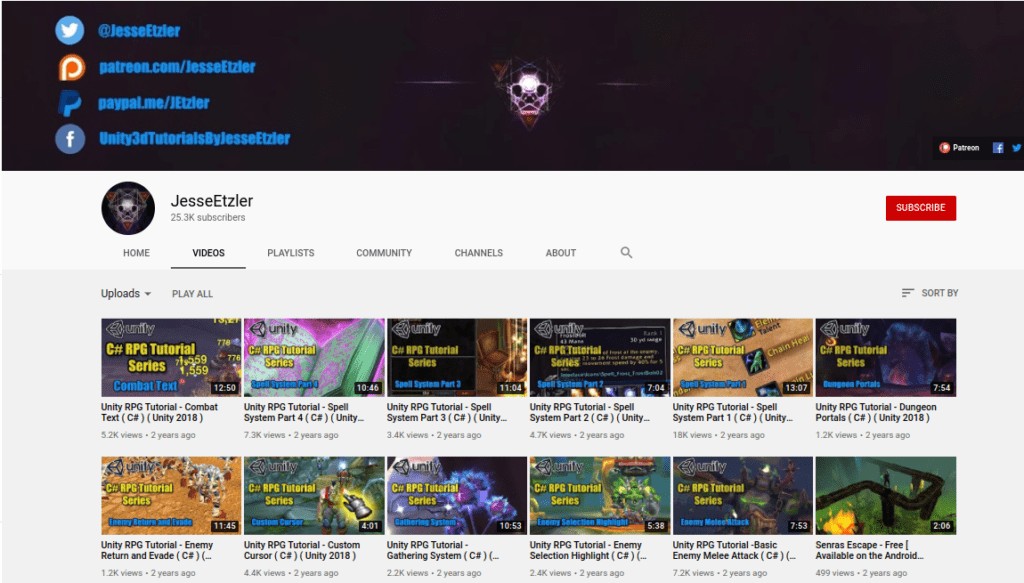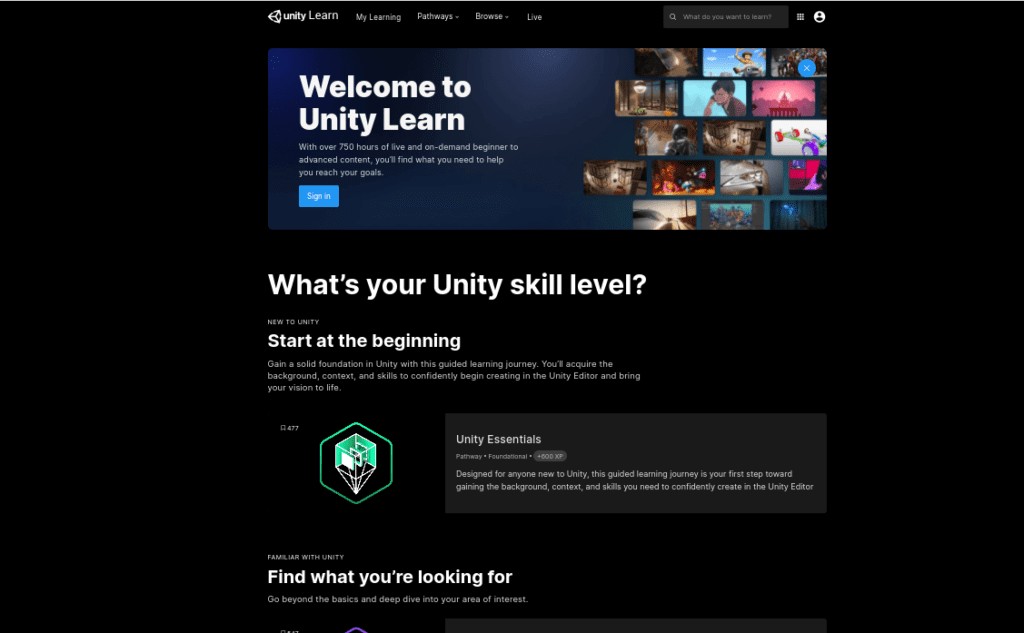Learning Unity 3D can unlock exciting opportunities in game development, simulation, and interactive design. At LEARNS.EDU.VN, we provide you with the knowledge and resources to navigate this journey effectively, offering a clearer understanding of the time commitment involved, along with actionable strategies to accelerate your learning curve. Discover essential Unity concepts, enhance your development skills, and explore various educational resources for a smooth and rewarding learning experience.
1. What is Unity 3D and Why Learn It?
Unity 3D is a versatile and powerful game engine that allows developers to create 2D and 3D games, simulations, and interactive experiences for various platforms. Its intuitive interface and extensive feature set make it a popular choice for both beginners and experienced developers.
1.1. Key Features of Unity 3D
- Cross-Platform Development: Develop once and deploy to multiple platforms, including Windows, macOS, iOS, Android, and more.
- Visual Editor: An intuitive visual editor allows for drag-and-drop functionality, simplifying the scene creation process.
- Asset Store: Access a vast library of pre-made assets, including models, textures, and scripts, to accelerate development.
- Scripting: Use C# to write custom scripts and control game logic.
- Animation Tools: Robust animation tools for creating complex character and object animations.
- Physics Engine: Built-in physics engine for realistic interactions and simulations.
- Community Support: A large and active community provides extensive support, tutorials, and resources.
1.2. Applications of Unity 3D
Unity 3D is used in a wide range of industries beyond gaming:
- Game Development: Creating games for PC, consoles, and mobile devices. Popular titles like “Pokémon Go,” “Among Us,” and “Hearthstone” were made with Unity.
- Virtual Reality (VR) and Augmented Reality (AR): Developing immersive experiences for VR headsets and AR applications for mobile devices.
- Architectural Visualization: Creating interactive walkthroughs and visualizations of buildings and spaces.
- Film and Animation: Producing animated films and visual effects.
- Education and Training: Developing interactive educational tools and training simulations.
1.3. Benefits of Learning Unity 3D
Learning Unity 3D offers numerous benefits:
- Career Opportunities: High demand for Unity developers in the gaming and interactive media industries.
- Creative Expression: Unleash your creativity by designing and building your own games and interactive experiences.
- Versatile Skill Set: Develop valuable skills in programming, design, and problem-solving.
- Community Support: Access a vast network of developers, artists, and educators for support and collaboration.
- Personal Growth: Enhance your technical skills and stay current with the latest trends in technology.
2. How Long Does It Realistically Take to Learn Unity 3D?
The time it takes to learn Unity 3D varies significantly based on your prior experience, learning style, and dedication. Here’s a breakdown:
2.1. Factors Influencing Learning Time
- Prior Programming Experience: If you have experience with programming languages like C#, JavaScript, or C++, you’ll likely learn Unity faster.
- Game Development Experience: Familiarity with game development concepts, such as game design, level design, and scripting, will accelerate your learning.
- Learning Style: Some people learn best through hands-on projects, while others prefer structured courses and tutorials.
- Time Commitment: The more time you dedicate to learning each week, the faster you’ll progress.
- Learning Resources: The quality and effectiveness of your learning resources, such as courses, tutorials, and documentation, will impact your learning speed.
2.2. Estimated Timeframes for Different Skill Levels
| Skill Level | Description | Estimated Timeframe |
|---|---|---|
| Beginner | No prior programming or game development experience. | 6-12 months |
| Intermediate | Some programming experience and basic knowledge of game development concepts. | 3-6 months |
| Advanced | Strong programming skills and a solid understanding of game development principles. | 1-3 months |
| Master | Extensive experience with Unity and a deep understanding of its features and capabilities. | Ongoing |






Beginner (6-12 months): If you’re starting from scratch, expect to spend several months learning the basics of programming, C#, and the Unity interface. You’ll need to work through tutorials, build simple projects, and gradually increase the complexity of your projects.
Intermediate (3-6 months): If you have some programming experience, you can focus on learning Unity-specific concepts and techniques. You can start building more complex games and experimenting with different features of the engine.
Advanced (1-3 months): If you’re an experienced programmer with a good understanding of game development, you can quickly pick up Unity and start working on advanced projects. You’ll likely focus on optimizing performance, implementing complex game mechanics, and using advanced features of the engine.
Master (Ongoing): Learning Unity is an ongoing process. As the engine evolves and new features are added, you’ll need to continue learning and experimenting to stay up-to-date.
2.3. Time Investment Breakdown
Here’s a sample breakdown of how you might spend your time learning Unity:
- Learning C#: 1-2 months (if starting from scratch)
- Understanding the Unity Interface: 1-2 weeks
- Basic Tutorials and Projects: 2-4 months
- Intermediate Projects: 3-6 months
- Advanced Projects: Ongoing
Remember, these are just estimates. Your actual learning time may vary.
3. Step-by-Step Guide to Learning Unity 3D
Here’s a step-by-step guide to help you learn Unity 3D effectively:
3.1. Step 1: Learn the Basics of C#
C# is the primary programming language used in Unity. If you’re new to programming, start by learning the basics of C#:
- Variables and Data Types: Understand how to store and manipulate data in C#.
- Operators: Learn how to perform calculations and comparisons.
- Control Flow: Master conditional statements (if/else) and loops (for/while).
- Functions: Learn how to create reusable blocks of code.
- Object-Oriented Programming (OOP): Understand classes, objects, inheritance, and polymorphism.
Resources for learning C#:
- LEARNS.EDU.VN: Offers introductory courses on C# and programming fundamentals.
- Microsoft Virtual Academy: Provides free courses and tutorials on C#.
- Codecademy: Offers interactive C# courses for beginners.
3.2. Step 2: Get Familiar with the Unity Interface
Unity’s interface consists of several key panels:
- Scene View: The visual editor where you create and arrange game objects.
- Game View: Shows the game as it will appear to the player.
- Hierarchy: Displays the structure of objects in the scene.
- Inspector: Allows you to modify the properties of selected objects.
- Project: Organizes all the assets in your project, such as scripts, models, and textures.
- Console: Displays errors, warnings, and debug messages.
Familiarize yourself with each panel and how they work together.
3.3. Step 3: Follow Basic Tutorials
Start with basic tutorials to learn the fundamentals of Unity:
- Unity Learn: Offers a wide range of tutorials for beginners, covering topics like creating basic games, scripting, and animation.
- YouTube: Search for beginner tutorials on Unity and follow along step-by-step.
- Official Unity Documentation: Refer to the official documentation for detailed explanations of Unity’s features and APIs.
3.4. Step 4: Build Simple Projects
Once you’ve completed a few tutorials, start building your own simple projects:
- 2D Platformer: Create a basic platformer game with simple movement and jumping mechanics.
- 3D Runner: Develop a 3D endless runner game with obstacles and collectibles.
- Simple Puzzle Game: Design a puzzle game with logic and problem-solving elements.
Building your own projects will help you apply what you’ve learned and develop your problem-solving skills.
3.5. Step 5: Explore Advanced Concepts
As you become more comfortable with Unity, explore advanced concepts:
- Animation: Learn how to create complex character and object animations.
- Physics: Understand how to use Unity’s physics engine for realistic interactions.
- UI Design: Design and implement user interfaces for your games.
- Networking: Learn how to create multiplayer games.
- VR/AR Development: Explore the world of virtual and augmented reality development.
- Shader Programming: Create custom shaders to enhance the visual appearance of your games.
3.6. Step 6: Join the Unity Community
Connect with other Unity developers to share knowledge, ask questions, and get feedback:
- Unity Forums: Participate in discussions and ask questions on the official Unity forums.
- Reddit: Join the r/Unity3D subreddit for discussions, tutorials, and project showcases.
- Discord: Join Unity-related Discord servers for real-time communication and collaboration.
- Local Meetups: Attend local Unity meetups to connect with developers in your area.
3.7. Step 7: Practice Regularly
Consistency is key to mastering Unity. Set aside time each day or week to practice and work on your projects. The more you practice, the faster you’ll improve.
4. Best Resources for Learning Unity 3D
Here are some of the best resources for learning Unity 3D:
4.1. Online Courses
- LEARNS.EDU.VN: Offers a variety of Unity courses for different skill levels.
- Udemy: Provides a wide range of Unity courses taught by experienced instructors.
- Course: Complete C# Unity Game Developer 2D
- Time: 35 hours
- Prerequisites: None
- Cost: $9.99
- Coursera: Offers Unity specializations and courses from top universities.
- Course name: Unity XR: How To Build AR and VR Apps Specialization
- Time: 3 months
- Prerequisites: None
- Cost: Free
- EdX: Provides Unity courses from leading institutions.
- Course name: Creating Virtual Reality (VR) Apps
- Time: 3 months
- Prerequisites: None
- Cost: Free
- Zenva Academy: Offers mini-degrees and courses focused on game development.
- Course name: Unity Game Development Mini-Degree
- Time: 29 hours
- Prerequisites: None
- Cost: $20 per month, $168 per month
4.2. Books
- Unity Game Development Cookbook: Essentials for Every Game 1st Edition by Paris Buttfield Addison, Jon Manning, and Tim Nugent.
- Learning C# Programming with Unity 3D by Alex Okita.
- Developing 2D Games with Unity: Independent Game Programming with C# 1st ed. Edition by Jared Halpern.
4.3. Online Tutorials
- Unity Learn: Offers free tutorials and project-based learning resources.
- Course name: Create With Code
- Time: About 36 hours
- Prerequisites: None
- Cost: Free
- YouTube: Search for Unity tutorials from channels like Brackeys, DaniDev, and Jason Weimann.
- JesseEtzler: This channel exclusively uploads tutorial videos on Unity. This channel covers everything from RPG development to mobile games. For the visual learners out there, this is a great way to start building games.
4.4. Documentation
- Official Unity Documentation: The official documentation is a comprehensive resource for learning about Unity’s features and APIs.
4.5. Online Communities
- Unity Forums: The official Unity forums are a great place to ask questions and get help from other developers.
- Reddit: The r/Unity3D subreddit is a popular community for Unity developers.
- Discord: Join Unity-related Discord servers for real-time communication and collaboration.
5. Optimizing Your Unity 3D Learning Process
Here are some tips to optimize your Unity 3D learning process:
5.1. Set Realistic Goals
Set achievable goals for each learning session. Don’t try to learn everything at once. Break down complex topics into smaller, more manageable chunks.
5.2. Focus on Hands-On Learning
The best way to learn Unity is by doing. Work on projects that interest you and challenge your skills. Don’t just passively watch tutorials. Actively participate and experiment with the code.
5.3. Practice Regularly
Consistency is key. Set aside time each day or week to practice and work on your projects. Even short, focused sessions can be effective.
5.4. Seek Feedback
Share your projects with other developers and ask for feedback. Constructive criticism can help you identify areas for improvement and learn new techniques.
5.5. Stay Up-to-Date
Unity is constantly evolving. Stay up-to-date with the latest features and updates by following Unity’s blog, attending conferences, and participating in online communities.
5.6. Learn to Debug
Debugging is an essential skill for any programmer. Learn how to use Unity’s debugging tools to identify and fix errors in your code.
5.7. Optimize Your Workflow
Learn keyboard shortcuts and use efficient coding practices to optimize your workflow. The faster you can iterate and experiment, the faster you’ll learn.
6. Skills Needed to Excel in Unity 3D Development
To excel in Unity 3D development, you’ll need a combination of technical and creative skills:
6.1. Technical Skills
- Programming: Strong proficiency in C# is essential.
- Mathematics: Understanding of linear algebra, calculus, and physics is helpful for advanced topics like 3D graphics and simulations.
- Version Control: Familiarity with version control systems like Git is important for collaborating with other developers.
- Problem-Solving: The ability to analyze problems and develop creative solutions is crucial for game development.
- Optimization: Understanding how to optimize your code and assets for performance is important for creating smooth and responsive games.
- UI/UX Design: Designing user interfaces that are intuitive and easy to use is important for creating engaging games.
6.2. Creative Skills
- Game Design: Understanding of game design principles, such as game mechanics, level design, and player experience, is essential for creating fun and engaging games.
- Art and Design: Knowledge of 2D and 3D art, animation, and visual effects can help you create visually appealing games.
- Sound Design: Understanding of sound design principles and the ability to create or source sound effects and music can enhance the atmosphere and immersion of your games.
- Storytelling: The ability to create compelling stories and characters can add depth and meaning to your games.
7. How to Create a Learning Plan for Unity 3D
A structured learning plan can help you stay on track and achieve your goals. Here’s how to create a learning plan for Unity 3D:
7.1. Define Your Goals
What do you want to achieve with Unity? Do you want to create your own games, work as a game developer, or explore other applications of Unity?
7.2. Assess Your Current Skills
What skills do you already have? Do you have any programming experience? Are you familiar with game development concepts?
7.3. Choose Your Learning Resources
Select the courses, books, tutorials, and online communities that you’ll use to learn Unity.
7.4. Create a Timeline
Set realistic deadlines for each stage of your learning journey. Break down your goals into smaller, more manageable tasks.
7.5. Track Your Progress
Keep track of your progress and adjust your learning plan as needed. Celebrate your achievements and don’t get discouraged by setbacks.
7.6. Sample Learning Plan
Here’s a sample learning plan for a beginner:
- Month 1: Learn the basics of C# (4 weeks)
- Month 2: Get familiar with the Unity interface (1 week), follow basic tutorials (3 weeks)
- Month 3: Build a simple 2D platformer game (4 weeks)
- Month 4: Explore advanced concepts like animation and physics (4 weeks)
- Month 5: Build a simple 3D runner game (4 weeks)
- Month 6: Join the Unity community and start working on a personal project (ongoing)
8. Common Challenges and How to Overcome Them
Learning Unity 3D can be challenging, but with the right strategies, you can overcome these obstacles:
8.1. Information Overload
There’s a lot to learn in Unity, and it can be overwhelming at times. Focus on the fundamentals first and gradually expand your knowledge. Break down complex topics into smaller, more manageable chunks.
8.2. Debugging Errors
Errors are a common part of programming. Learn how to use Unity’s debugging tools to identify and fix errors in your code. Don’t be afraid to ask for help from the Unity community.
8.3. Staying Motivated
It can be difficult to stay motivated when you’re learning a new skill. Set realistic goals, celebrate your achievements, and connect with other developers for support and inspiration.
8.4. Time Constraints
It can be challenging to find time to learn Unity when you have other commitments. Set aside dedicated time each day or week to practice and work on your projects. Even short, focused sessions can be effective.
9. Career Opportunities with Unity 3D Skills
Learning Unity 3D can open up a wide range of career opportunities:
9.1. Game Developer
Create games for PC, consoles, mobile devices, and VR/AR platforms.
9.2. VR/AR Developer
Develop immersive experiences for virtual and augmented reality applications.
9.3. Simulation Developer
Create simulations for training, education, and research.
9.4. Architectural Visualization Specialist
Create interactive walkthroughs and visualizations of buildings and spaces.
9.5. Technical Artist
Create tools and pipelines to streamline the art creation process.
9.6. Unity Trainer/Educator
Teach others how to use Unity and develop their own games and interactive experiences.
9.7. Freelance Unity Developer
Work on a variety of projects for different clients on a freelance basis.
10. Unity Certifications to Boost Your Career
Earning Unity certifications can demonstrate your expertise and enhance your career prospects:
- Unity Certified User: Tests your foundational knowledge of the platform.
- Unity Certified Associate: For aspiring game developers who want to showcase their Unity skills.
- Unity Certified Professional: For those with 2-4 years of professional Unity experience.
- Unity Certified Expert: Demonstrates the highest level of Unity skills, requiring 5+ years of experience.
11. Staying Updated with Unity 3D Trends
The field of game development is constantly evolving. Stay updated with the latest trends and technologies by:
- Following Unity’s Blog: Stay informed about new features, updates, and industry news.
- Attending Conferences: Attend Unity conferences and events to learn from experts and network with other developers.
- Participating in Online Communities: Engage with the Unity community on forums, Reddit, and Discord to stay informed about the latest trends and technologies.
- Experimenting with New Features: Try out new features and technologies as they are released to stay ahead of the curve.
12. Conclusion: Is Learning Unity 3D Worth It?
Yes, learning Unity 3D is definitely worth it! It’s a versatile and powerful game engine that opens up a wide range of career opportunities and creative possibilities. While it takes time and effort to master, the rewards are well worth the investment.
At LEARNS.EDU.VN, we are dedicated to providing you with the knowledge and resources you need to succeed in your Unity learning journey. Whether you’re a beginner or an experienced developer, we have courses and resources to help you achieve your goals.
FAQ: Frequently Asked Questions About Learning Unity 3D
1. Is Unity 3D free to use?
- Yes, Unity offers a free version for personal use and small businesses.
2. Do I need to know programming to learn Unity?
- Yes, programming is essential for Unity development. C# is the primary language used in Unity.
3. How long does it take to learn C# for Unity?
- It can take 1-2 months to learn the basics of C# if you’re starting from scratch.
4. What are the best resources for learning Unity?
- Unity Learn, Udemy, Coursera, YouTube, and the official Unity documentation are excellent resources.
5. What are some common challenges when learning Unity?
- Information overload, debugging errors, staying motivated, and time constraints are common challenges.
6. What career opportunities are available with Unity skills?
- Game developer, VR/AR developer, simulation developer, and architectural visualization specialist are some of the career opportunities.
7. Are Unity certifications worth it?
- Yes, Unity certifications can demonstrate your expertise and enhance your career prospects.
8. How can I stay up-to-date with Unity trends?
- Follow Unity’s blog, attend conferences, and participate in online communities.
9. What kind of computer do I need to run Unity?
- Unity can run on most modern computers. Check the official Unity website for minimum system requirements.
10. Can I use Unity to create games for mobile devices?
- Yes, Unity supports cross-platform development for mobile devices.
Ready to start your Unity 3D journey? Visit LEARNS.EDU.VN today to explore our courses and resources. Unlock your potential and create amazing interactive experiences with Unity 3D. For more information, contact us at 123 Education Way, Learnville, CA 90210, United States, Whatsapp: +1 555-555-1212, or visit our website: LEARNS.EDU.VN. Let learns.edu.vn be your guide to mastering Unity 3D!
